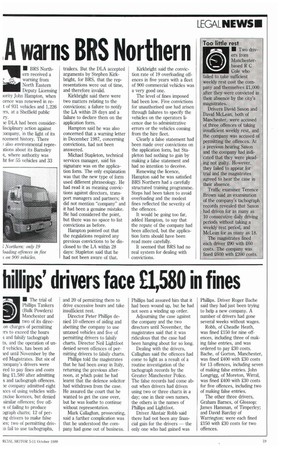A warns BRS Northern
Page 21

If you've noticed an error in this article please click here to report it so we can fix it.
• ]IRS Northern received a warning from North Eastern Deputy Licensing iority John Hampton, when cence was renewed in ret of 931 vehicles and 1,226 ,rs, at a Sheffield public Lry.
ie DLA had been considerlisciplinary action against :ompany, in the light of its rcement history. There
also environmental repreations about its Barnsley t, where authority was ht for 55 vehicles and 33 trailers. But the DLA accepted arguments by Stephen Kirkbright, for BRS, that the representations were out of time, and therefore invalid.
Kirkbright said there were two matters relating to the convictions; a failure to notify the LA within 28 days and a failure to declare them on the application form.
Hampton said he was also concerned that a warning letter in December 1987, concerning convictions, had not been answered.
Michael Stapleton, technical services manager, said his signature was on the application form. The only explanation was that the new type of form used different phraseology. He had read it as meaning convictions against directors, transport managers and partners; it did not mention "company" and it had been a genuine mistake. He had considered the point, but there was no space to list convictions as before.
Hampton pointed out that the regulations required any previous convictions to be disclosed to the LA within 28 days: Stapleton said that he had not been aware of that. Kirkbright said the conviction rate of 19 overloading offences in five years with a fleet of 900 commercial vehicles was a very good one.
The level of fines imposed had been low. Five convictions for unauthorised use had arisen through failures to specify the vehicles on the operators licence due to administrative errors or the vehicles coming from the hire fleet.
Clearly a false statement had been made over convictions on the application form, but Stapleton had nothing to gain by making a false statement and had no intention to deceive.
Renewing the licence, Hampton said he was satisfied BRS Northern had a carefully structured training programme. Steps had been taken to avoid overloading and the modest fines reflected the severity of the offences.
It would be going too far, added Hampton, to say that the repute of the company had been affected, but the application form should have been read more carefully.
It seemed that BRS had no real system for dealing with convictions.










































































































































































